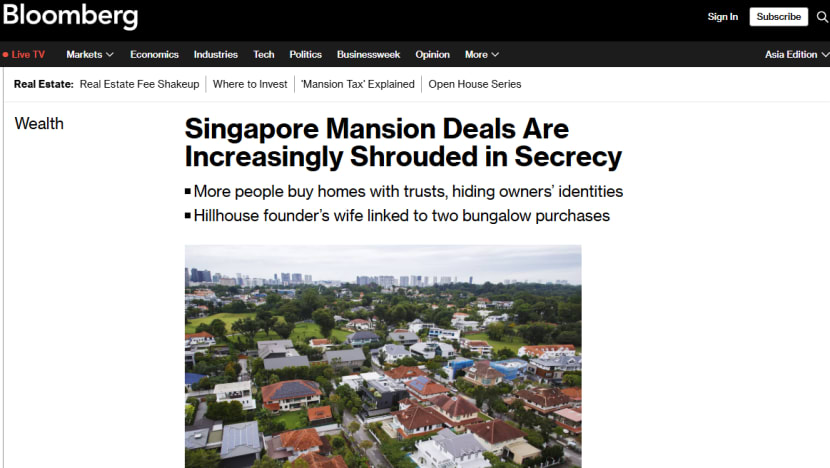Bloomberg gets POFMA order over Good Class Bungalow article
The news organisation is required to carry a correction notice against its Dec 12 article, "Singapore mansion deals are increasingly shrouded in secrecy".

A screengrab of the Bloomberg article, "Singapore Mansion Deals Are Increasingly Shrouded in Secrecy". (Image: Bloomberg)

This audio is generated by an AI tool.
SINGAPORE: The news organisation Bloomberg was issued a Protection from Online Falsehoods and Manipulation Act (POFMA) correction direction by the Singapore government on Monday (Dec 23).
The correction order, also handed out to The Edge Singapore, The Independent Singapore and The Online Citizen, relates to articles and posts made by the publications about Good Class Bungalow (GCBs) transactions, said the Ministry of Law in a press release.
Bloomberg published the Dec 12 article, titled Singapore Mansion Deals Are Increasingly Shrouded in Secrecy, on its website. It was reposted on Bloomberg's Facebook and X accounts. The article was republished in full by The Edge Singapore on its website on the same day, and reposted on its Facebook account.
The Independent Singapore and The Online Citizen also published articles, commenting on the original Bloomberg piece, on their websites on Dec 12, and subsequently reposted their articles on their respective social media pages.
The four publications will be required to carry correction notices against the articles and posts, which state that the said articles or posts communicated false statements of fact and provide a link to the Government’s clarification, said the ministry.
"This will allow readers to read both versions and draw their own conclusions."
A check by CNA on Monday at about 1.20pm showed that articles by The Edge Singapore and The Independent Singapore are no longer online.
As of Monday evening, Bloomberg has added the correction notice to its article, as well as its Facebook and X posts.
However, it added under the correction notice that it "respectfully disagrees" with the correction direction and reserves its right to appeal and challenge it. Bloomberg added that it stands by its reporting.
The Edge Singapore uploaded an article with the correction notice on its website and put up posts on Facebook and X.
The Independent Singapore posted the correction notice on its website and on Facebook.
FALSEHOODS: SINGAPORE GOVERNMENT
According to the government's fact-checking website, Factually, Bloomberg's false statements "attack the transparency of property transactions in Singapore".
The Bloomberg article, according to Factually, falsely claimed that there are no publicly available government records of GCB sale transactions if caveats are not lodged, and that the identity of the ultimate beneficial owner need not be disclosed to the government.
As a result of these claims that Factually attributed to Bloomberg, this, according to Factually, "allows parties (including Ministers and rich migrants) to transact such properties in a way facilitative of money laundering".
Factually also said that the article claimed that GCB property transactions "can be carried out without any checks by the government on the identities of the ultimate beneficial owners" and that "primary responsibility to combat money laundering in property transactions is left to property agents and other service providers".
"Together, these falsehoods give the impression that Singapore does not have a robust legal framework to require disclosure of information to the government in GCB transactions, which may allow wrongdoing to take place undetected. It is in the public interest that these falsehoods are addressed so that public confidence in the government is not undermined," said Factually.
Singapore refutes Bloomberg statements
Government: Information on property ownership and transfers, including for all GCBs, is available on the Integrated Land Information Service portal, regardless of whether a caveat was lodged for the sale transaction.
Property ownership and transfer information, including details about GCBs, is accessible through the Integrated Land Information Service (INLIS), managed by the Singapore Land Authority (SLA).
This, according to the Factually website, applies regardless of whether a caveat has been lodged for a transaction.
"Caveats are not intended for tracking property transactions or ensuring transparency," according to Factually.
"The purpose of a caveat is to protect the interest of the purchaser, mortgagee or other parties that hold a legal right in the property. They are lodged voluntarily by parties who wish to protect their interest in a property.
"For example, one who purchases property may choose to lodge a caveat to protect his/her interest pending completion of the transaction and lodgement of the final transfer with SLA’s Land Titles Registry."
Government: Singapore mandates strict disclosure of identities and citizenship of purchasers and ultimate beneficial owners in all landed residential property transactions, including GCB transactions.
The government "adopts a strict approach to the ownership of landed residential properties by foreigners", such as obtaining approval before purchasing such properties.
It added that there have been no approvals given to foreign purchasers of GCBs since 2021 in any capacity, whether personal or otherwise.
"As part of the sale process for landed residential properties, including GCBs, SLA requires the purchaser’s identity and citizenship to be declared to SLA when lodging the instrument of transfer at the Land Titles Registry," according to Factually.
"Furthermore, the purchaser’s solicitor must certify that the information provided in the instrument of transfer is correct and that all relevant provisions of the RPA have been complied with."
For trust-based transactions of landed residential properties, solicitors must submit the trust deed, and SLA verifies the ultimate beneficial owner’s identity. For company-based purchases, only Singapore-incorporated companies with Singapore citizen or entity directors and members can apply.
Government: The government has the primary responsibility to combat money laundering in property transactions, and has put in place a robust anti-money laundering (AML) framework to counter money-laundering risks in property transactions.
The property transactions include those made through trust arrangements and companies, said Factually.
The AML framework contains three strategies, which include strengthening the legal and regulatory framework to prevent criminals from operating in Singapore, developing measures to better detect signs of illicit activity, and taking decisive administrative, regulatory and criminal measures to enforce laws.
"The government requires regulated ‘gatekeepers’ in the private sector involved in property transactions to comply with AML requirements to conduct checks to identify and verify the identities of their customers, including the beneficial owners," said Factually.
"Where there are higher risks, gatekeepers must also verify the sources of wealth of their customers. The financial institutions involved are required to know the customers and purpose of the transactions, and as needed, the sources of the funds."
It added that the requirements are similar to standards in leading financial centres, with obligations also imposed on lawyers who handle such transactions, real estate salespersons, and estate agencies.
LEGAL ACTION BY MINISTERS NAMED IN ARTICLE
Law and Home Affairs Minister K Shanmugam and Manpower Minister Tan See Leng jointly said on Dec 16 they were taking legal action against Bloomberg and other media outlets for publishing statements over their property transactions.
Both ministers added they would issue letters of demand in relation to the article, which they consider "libellous".
A letter of demand, usually sent by lawyers, contains a list of demands. If the recipients - in this case, Bloomberg and the other three media outlets - do not meet these demands, legal action, such as a lawsuit, may follow.
Bloomberg declined to comment when contacted by CNA about the POFMA order and letters of demand sent by the two ministers.














